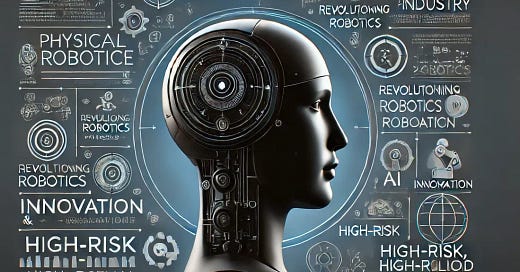Physical Intelligence: $2B Valuation and $400M Funding—Revolutionizing Robotics in a $210B Industry with High-Risk, High-Reward Potential🚀
Your Weekly Shortcut to Deeptech Investing—Exclusive Trends & Startup Reports for VCs & Angels in Just 5 Minutes
In a flash: Physical Intelligence is an emerging robotics startup based in San Francisco redefining the industry with its universal software, pi-zero, designed to enable robots to perform diverse tasks without the need for specialized programming. Backed by notable investors like Jeff Bezos and OpenAI, the company aims to democratize robotics and expand automation into everyday applications, from logistics to retail.
Executive Summary 📊
Physical Intelligence, backed by Jeff Bezos and OpenAI, is redefining robotics with universal software enabling robots to perform diverse tasks without task-specific programming. With a recent valuation of $2 billion and $400 million in funding, this startup offers significant growth potential in the rapidly expanding robotics and AI sectors. Retail investors should weigh the opportunities and risks in this early-stage innovation.
Company Profile 🧠
Founded: 2022
Headquarters: San Francisco, CA
Core Product: pi-zero, a universal robotic software capable of multi-tasking (e.g., folding laundry, bagging groceries).
Mission: Democratizing robotics by reducing programming complexity, making automation more accessible across industries.
Market Opportunity 🌍
Robotics Market Growth: The global robotics market is projected to grow at a CAGR of 20%, reaching $210 billion by 2030.
AI Integration: Physical Intelligence taps into the AI-driven automation trend, addressing labor shortages and enhancing productivity in logistics, retail, and manufacturing.
Competitive Advantage: Unlike conventional robotics companies, Physical Intelligence focuses on adaptable software, reducing development time and costs for clients.
Why It Matters for Retail Investors:
The market's growth potential positions Physical Intelligence as a key player in the automation revolution, creating opportunities for high returns if the company scales successfully.
Top 3 Competitors
Boston Dynamics 🦾
Pros: Known for cutting-edge robots (Spot, Atlas) targeting logistics and defense.
Cons: High costs and profitability issues; owned by Hyundai, limiting direct retail investment.
Verdict: Strong robotics brand but not ideal for retail investors due to access and profit concerns.
Covariant 📦
Pros: AI-powered logistics robotics with major partnerships (e.g., Knapp).
Cons: Private company, limiting retail access; scaling phase poses execution risks.
Verdict: Promising but not easily investable for individual retail investors.
Universal Robots (via Teradyne) 🛠️
Pros: Leader in cobots with scalable operations; accessible through Teradyne (publicly traded).
Cons: Smaller innovation focus compared to startups.
Verdict: Best retail option for stable robotics exposure through Teradyne.
Retail Investor Suggestion:
For retail investors, Universal Robots (Teradyne) offers stability, while Physical Intelligence is a higher-risk, high-reward bet on innovation. Covariant excels in logistics but isn’t accessible to individual investors. 🚀
Financial Overview 💰
Funding: Raised $400 million in its latest early-stage round on November 4 2024, with investors including Jeff Bezos, OpenAI, Thrive Capital and Lux Capital.
Valuation: $2 billion post-funding.
Revenue: Early-stage, with revenues expected to grow as the product gains traction in key sectors like retail and logistics.
Retail Investor Benefit:
Strong financial backing and high-profile investors indicate market confidence, but the company is still pre-revenue, meaning returns depend on successful execution.
Management and Leadership 🏆
CEO: Dr. Alex Hoffman, an MIT robotics expert with extensive experience in AI and automation.
CTO: Maria Gonzalez, a Stanford graduate specializing in adaptive algorithms and robotic intelligence.
Advisors: Supported by experts from OpenAI and Amazon Robotics, offering a robust knowledge base.
Why It Matters for Retail Investors:
A strong leadership team with a proven track record in robotics and AI enhances the company’s execution potential.
Investment Considerations 📉📈
Benefits:
High Market Demand: Rising demand for automation across industries.
Scalable Model: Universal software approach allows for multi-industry applications.
Prestigious Backing: Funding from Jeff Bezos and OpenAI boosts credibility.
Risks:
Market Competition: Competing with established robotics giants like Boston Dynamics and emerging players.
Execution Risk: Scaling a universal solution across industries requires substantial resources and operational excellence.
Pre-Revenue Stage: Returns are speculative and depend on successful commercialization.
Valuation and Exit Potential 💹
Current Valuation: $2 billion.
Exit Strategy:
IPO Potential: Likely to go public in 3-5 years if it scales successfully.
Acquisition Target: Could attract major players like Amazon or Google looking to enhance their robotics capabilities.
Retail Investor Benefit:
Potential for high returns through IPO or acquisition, but the pre-revenue status adds uncertainty.
Conclusion 🎯
Physical Intelligence is a promising startup revolutionizing robotics with its universal software platform. For investors, it offers exposure to the booming robotics and AI markets, supported by strong financial backing and leadership.
Key Takeaway: While the company’s innovative approach and high-profile support are compelling, its early-stage nature means investors should view it as a high-risk, high-reward opportunity. Diversify your portfolio to balance potential gains from emerging tech with stable investments.
Enjoying this? 🚀
— Share it with a friend! 🙌




